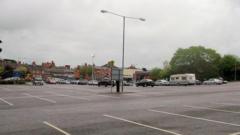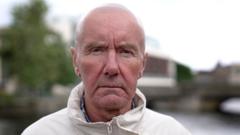Will a New Housing Estate Replace the 450-Space Car Park?

Transforming a Car Park into Affordable Housing: A Case Study in Welshpool
In the face of a growing housing crisis, the Powys County Council in Wales is considering a significant transformation of a 450-space car park into affordable housing units. This ambitious plan, which aims to construct 32 homes on Berriew Street in Welshpool, is part of the local government's broader strategy to meet increasing demands for social housing. As urban areas grapple with rising living costs and housing shortages, developments like this raise crucial questions about community needs, resource allocation, and the balance between parking and housing.
The Need for Affordable Housing
According to Matthew Dorrance, the deputy leader of Powys County Council and the cabinet member for housing, the local authority has set an ambitious target to build 350 social homes for rent by 2031. This target is driven by a stark reality: land for development is in short supply, and demand for social housing is at an all-time high. A report indicated that 414 households have Welshpool as their first choice for housing, a clear indicator of the pressing need for affordable living spaces.
Current Housing Situation in Welshpool
The statistics surrounding homelessness in Welshpool are alarming. There are currently 33 homeless households residing in temporary accommodation, with an average waiting time of 370 days before they are housed. This situation highlights the urgency for immediate action to alleviate housing pressures. The proposed development aims to address these challenges by providing much-needed social homes while still retaining 56 parking spaces from the original car park.
Understanding the Proposal
The plan to convert the Berriew Street car park into affordable housing is not without its complexities. The car park's transfer from the council's highways, transport, and recycling department to the housing department involves a financial assessment that has drawn scrutiny from various council members. The estimated cost for this transfer is £280,000, significantly lower than the market value of £525,000.
Financial Implications and Challenges
During the economy, residents, and community scrutiny committee meeting, Liberal Democrat councillor Corinna Kenyon-Wade raised questions regarding the financial calculations underpinning the proposal. In response, Andy Thompson, the head of housing services, explained that the figures were based on the projected market value of developed homes versus the costs associated with building homes for social rent. This differentiation is critical for understanding the financial viability of such projects and the rationale behind the proposed car park conversion.
Community Responses and Concerns
As with any significant urban development, the proposal has sparked a variety of responses from local council members and residents. Conservative councillor Peter Lewington has expressed the need for a more balanced view of the proposal, particularly regarding the potential impact on local businesses due to the reduction in parking spaces. The local economy often relies on accessible parking to attract visitors and support retail establishments, making this a critical point of discussion.
Balancing Housing Needs with Economic Viability
One of the fundamental challenges facing the council is the need to balance the urgent demand for affordable housing with the economic realities of maintaining a vibrant town center. While the creation of new housing units is essential, the loss of parking spaces could have adverse effects on local businesses, leading to potential economic downturns if not managed carefully.
Legal Aspects of Land Transfer
Legal considerations surrounding the transfer of land between council departments have also come under scrutiny. Andy Thompson assured committee members that the move adheres to legal requirements, providing some reassurance to those concerned about the transparency and legality of the proposal. However, ongoing discussions around the legality and ethics of such transfers highlight the complexities of local governance and urban planning.
Future Meetings and Decision-Making
The proposal is set to be discussed further at an upcoming cabinet meeting. This meeting will provide an opportunity for council members to weigh the benefits of the housing development against the potential drawbacks related to parking and local business support. The outcome of this meeting could significantly influence the direction of affordable housing initiatives in Welshpool.
Engaging the Community
As the council moves forward with deliberations, engaging the community will be essential. Public forums and discussions can help gather resident feedback, allowing the local authority to make more informed decisions that reflect the needs and concerns of those directly impacted by the proposed changes.
Conclusion: A Step Towards Community Solutions
The proposal to convert a car park into affordable housing in Welshpool represents a critical juncture in addressing the local housing crisis. With a pressing demand for social housing and limited land availability, innovative solutions like this are necessary. However, as with any development, careful consideration must be given to the impact on existing community resources, including parking and local businesses.
The conversation surrounding this proposal is ongoing, and it will be interesting to see how the local council balances these competing interests in their decision-making process. As urban areas continue to evolve, such developments may set a precedent for how communities can adapt to changing needs while fostering growth and sustainability.
FAQs
What is the primary goal of the Powys County Council's housing proposal?
The primary goal is to build 32 affordable housing units on the Berriew Street car park to meet the urgent demand for social housing in Welshpool.
How many parking spaces will remain after the proposed development?
If the development goes ahead, 56 parking spaces will remain available in the car park.
What are the financial implications of transferring the car park for housing development?
The estimated cost for transferring the car park is £280,000, while its market value is around £525,000, raising questions about the financial calculations involved.
How does the council plan to balance housing needs with economic impacts on local businesses?
The council is considering community feedback and discussions regarding the potential implications for local businesses due to reduced parking availability.
As communities seek solutions to the housing crisis, developments like the one proposed in Welshpool demonstrate the complexities involved in urban planning. Balancing the need for affordable housing with the economic vitality of local businesses is a challenging but essential task for local authorities. What are your thoughts on the relationship between housing development and community resources? #AffordableHousing #UrbanDevelopment #CommunityPlanning
Published: 2025-07-10 15:59:08 | Category: wales



